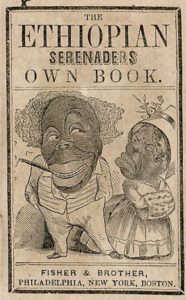
Program Flyer
*The Ethiopian Serenaders are noted on this date in 1840. From Boston, they were a white-American Blackface minstrel troupe successful in the 1840s and 1850s.
They were managed and directed by James A. Dumbolton through various line-ups and are sometimes mentioned as the Boston Minstrels, Dumbolton Company, or Dumbolton's Serenaders. The group was formed in Boston, Massachusetts, becoming the first in the city to play "concerted negro music" before performing at the Chatham Theatre in New York City. Under Dumbolton's management, the original all-white line-up included Francis Carr Germon, Moody G. Stanwood, Anthony Fannen (Tony) Winnemore, E. J. Quinn, J. Baker, and G. Wilson.
Their first major performance was for John Tyler at the White House in 1844 as part of the "Especial Amusement of the President of the United States, His Family, and Friends." After this success, the troupe altered its act to make it more "refined" and to appeal to a higher-class audience than had traditionally patronized blackface entertainment. The Ethiopian Serenaders were contrary to intersectionality as entertainers or artists. They billed their shows as blackface "concerts" and added songs of a sentimental, romantic nature, even going so far as to perform pieces from popular operas. In exchange, they cut out vulgar, humorous material like that used by the Virginia Minstrels and other troupes and saw great success with this formula.
According to Dwight's Journal of Music, they "popularized 'Rosa Lee,' 'Dearest Mae,' 'Mary Blane,' &c., a species of composition more nearly bordering upon respectability than the characteristic negro songs by which they had been preceded."They were working-class and white, except William Lane, 'Juba,' a dancer of color in a segregated business.